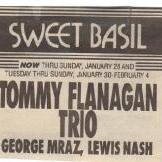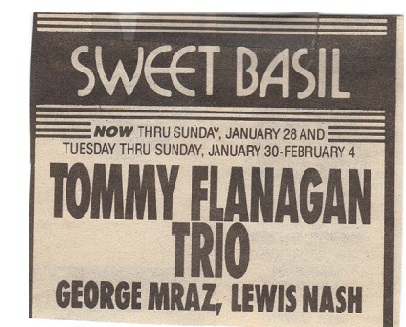-
Posts
14,859 -
Joined
-
Last visited
-
Donations
0.00 USD
Content Type
Profiles
Forums
Events
Blogs
Everything posted by Hardbopjazz
-
Yes. I have that album. It is real real good. I knew I've heard this version of the tune.
-
#2, I know it isn't going to be him, but is it Bill Frisell on guitar? The last time I saw Bill live he played Stranger in Paradise and it reminds me of his rendition.
-
Happy birthday
-
Sonny in Munich 1992.
-
yes, they're the only two. You can listen to Sonny Rollins interview at the below link. https://www.cbc.ca/radio/q/a-great-day-in-harlem-sonny-rollins-and-robert-benton-celebrate-60th-anniversary-of-the-iconic-jazz-photo-1.4999051?fbclid=IwAR2LDpjSPky0onpeuoQgSyt4bUSyR9aN4AIsb8bfqBcVx5xa8lLX3aMeozI A Great Day in Harlem: Sonny Rollins and Robert Benton celebrate 60th anniversary of the iconic jazz photo 'It was a great day in Harlem indeed,' says jazz legend Sonny Rollins Sixty years ago this month, Esquire magazine published its Golden Age of Jazz issue. Inside, plastered across two pages, was a photograph that would go on to become a pop culture artifact. It was called A Great Day in Harlem, by photographer Art Kane, and it brought together 57 jazz musicians in front of a New York apartment building. Since that photo was taken, Kane and many of the musicians who appeared in the photo have died. Former Esquire magazine art director Robert Benton and one of the last two surviving subjects of the photo, saxophonist Sonny Rollins, take us back to the day of the shoot and discuss the lasting impact of A Great Day in Harlem. Listen10:12
-
Good for him. Glad he’s still going strong.
-

Album Covers That Bring Back Bad Memories
Hardbopjazz replied to JSngry's topic in Miscellaneous Music
-
Wow. I didn't know about this.
-
Benny remembering the photo shoot.
-
Wow, a major loss. RIP Michel.
-
Happy Birthday.
-
Yes, it is Bishop, Jr, and Eldridge.
-
That is Phil Schapp.
-
I haven't read the other responses yet. The only ones I have any guesses on so far are track #10. Summertime. Is this Ben Webster? If so I don't know this recording. I thought I've collected all his albums. #11 is Gene Harris on piano. I will listen again before reading the other participants answers.
-
Randy Weston was a major loss. Every time he played in NYC, I would make an attempt to see him live. I got to see him over the years, either solo or with his band 36 times. The last time, July of 2018, he debuted five new compositions which he hadn't recorded yet, at least to my knowledge.
-
Sonny Rollins Speaks The Saxophone Colossus argues for his Freedom Suite Published 02/16/2017 By Michael J. West In late October, we received a friendly but troubled call from one of our longtime subscribers, Sonny Rollins. He was concerned about the absence of his 1958 LP Freedom Suite from Michael J. West’s “Protest Jazz” sidebar, a supplement to the cover story featuring Kamasi Washington, Christian Scott aTunde Adjuah and writer Ashley Kahn. Our response to Rollins was apologetic, of course, and we were quick to explain that despite its “JT Essentials” header, the sidebar was simply a roundup of entry points into the rich legacy of jazz as social protest; we couldn’t possibly hit all of the “essentials” in a brief article of a few hundred words. Still, Rollins’ arguments were mighty, and we wanted to give him an opportunity to plead his case here—as if his music hadn’t already. Evan Haga, Editor It was quite distressing to see that the JazzTimes article on protest music in jazz jumped from Louis Armstrong’s “(What Did I Do to Be So) Black and Blue” and Billie Holiday’s “Strange Fruit” right to 1960 and Max Roach’s We Insist! The Freedom Now Suite. Well, before that was Freedom Suite. I had an activist grandmother, and when I was a little boy, 3, 4, 5 years old, she used to take me on marches up and down Harlem for people like Paul Robeson and segregation cases on 125th Street. That was just a part of my upbringing. Later, when I was playing music and making a little name for myself, I was able to record “The House I Live In,” which was very much a civil-rights anthem at the time. And I made an early record with Miles Davis, “Airegin,” which was Nigeria spelled backwards. It was an attempt to introduce some kind of black pride into the conversation of the time. That was my history. The record Freedom Suite was made in the beginning of 1958. It was a trio recording with Max Roach and Oscar Pettiford, and it was an important album. The producer, Orrin Keepnews, took a lot of heat for that record. I made a statement [about civil rights on the back cover of] that record, and he even had to say at one time that he wrote the statement, which is ridiculous. But he wanted to record me on his Riverside label, and that was the piece that he had, and he accepted it. I took some heat for it as well. I was playing a concert in Virginia, something at a school down there, and I remember being confronted—not in a hostile or violent way, just verbally—about why I made this record, and so on and so forth. There were a lot of those [incidences]. It wasn’t a big deal for me, because as I said, it was quite normal. I was born into a family that was always very cognizant of those things. I do remember that the controversy was slightly scary—but not too much, because I was a big, strong guy, and when you’re young you think you’re indestructible. But in retrospect it was a little scary, yes. And it was also one of these situations where some people talked with me about it and some people didn’t, but it was always there, hanging over everything. Especially at that time; 1958 was pretty early on in the consciousness of the civil-rights movement. So it wasn’t like something that nobody knew about; it was a controversial record. They actually changed the title to Shadow Waltz [when the album was reissued by the Jazzland label in the early 1960s]. “The Freedom Suite” took up one half of the album, and the other half was standard compositions. So they took a name from the other half of the record. Anyway, it’s history—but it is history. And that’s why I was distressed to see it omitted from the list. In the modern jazz era, that was the first record that reflected the civil-rights period. That was the first that I know of. It was an important thing, a groundbreaking record. I just don’t want to be written out of history. https://jazztimes.com/features/sonny-rollins-speaks/
-

Camille Bertault e Nelson Faria - Giant Steps
Hardbopjazz replied to mjzee's topic in Miscellaneous Music
I had the pleasure of seeing her live. She is very good at vocalese. It seems to come natural for her. -

What live music are you going to see tonight?
Hardbopjazz replied to mikeweil's topic in Live Shows & Festivals
George Coleman Quintet. Harold Mabern on piano. -
Thanks all.
-
Another major loss. What an innovator. RIP, Joseph.
_forumlogo.png.a607ef20a6e0c299ab2aa6443aa1f32e.png)
